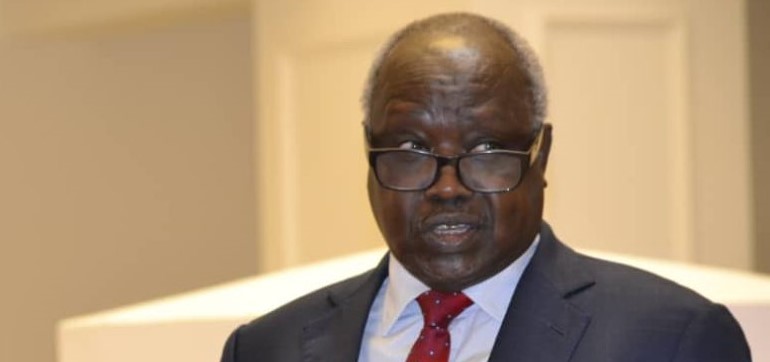Get me right: the affairs of South Sudan are for South Sudanese. Those using state agencies to silence the citizens are the makers of the country’s downfall. We need to speak out.
Hon. Nhial Deng Nhial’s declaration has accomplished what few within the SPLM have the courage to undertake: speaking truth to a movement that has lost its moral direction. Nhial’s words were both steady and piercing, principled but painful. They served as a reminder of the promise that founded this nation: that South Sudan would be led by individuals of courage, intellect, and conviction.
To me, his message was not one of rebellion. It was a straightforward call for reform—a reform that evokes memories of purpose. However, the response from Hon. Bol Makueng Yuol, the Secretary for Political Affairs, Mobilization, and Organization, fell short of what the moment demanded. His reply was narrow-minded, personal, and defensive. Altogether, it was inconsequential. Instead of engaging in a discussion of ideas, he resorted to attacks, inadvertently exposing the weaknesses of the very system he sought to defend.
In the minds of genuine South Sudanese, the SPLM today is haunted not by its enemies, but by its own appointments. The deputies, starting with Dr. Benjamin Bol Mel, the Secretary General, and the new officeholders paraded as the party’s torchbearers, represent a downgrade in political intellect and moral character. These individuals are below average in all spheres of politics, diplomacy, and economics; they are the very embodiment of incompetence and cluelessness. This is a painful contrast to the intellectual depth and political maturity of the movement’s early architects, who are now being disrespectfully phased out.
Many of the current SPLM top leaders were selected not for their competence but for their compliance and conformity with Benjamin Bol Mel’s deadly project: “Looting the country and usurping power to protect the loot.” The selection is never based on meritocracy, and thus, the changed face of the SPLM can no longer be characterized by courage, but by convenience and sycophancy. This is how reform dies. Any reform that dies, dies not through confrontation, but through the quiet substitution of brilliance with mediocrity.
The Renaissance Declaration, as claimed by Hon. Bol Makueng, was aimed at transforming the SPLM into a hub of innovative ideas and strong discipline. In fact, we are now observing a gradual erosion of that vision. Reformers are being replaced by loyalists, and thinkers by those who prioritize comfort.
A party that once embodied the spirit of liberation, unity, and a vision grounded in the hopes of a prosperous nation has become introspective. Today, that spirit is under siege from within. This new stance has blurred the lines between loyalty and effective leadership while misinterpreting the silence of the citizens as a sign of unity.
It is true that President Salva Kiir Mayardit deserves respect for his endurance and statesmanship. But this fact stands: even the most experienced captain must periodically assess his crew. Those entrusted with guiding this movement are dimming its light. They surround the President with applause instead of constructive advice, which is how leaders become disconnected from the country they have helped build.
South Sudanese from all walks of life—the farmers, the soldiers, the teachers, traders, and fishmongers—are observing closely. They are aware when leadership prioritizes its own interests over the country’s. They are speaking up in a low tone, saying they have witnessed a troubling transformation: a shift from liberation to comfort, from reform to resistance, and from comradeship to competition. To those looting the country and destroying the SPLM vision—those who call themselves students of Dr. John Garang when they never came close to him—underscore this: the silence of the people should not be mistaken for ignorance; it is a reflection of their fatigue.
Citizens are saying that Nhial Deng Nhial’s declaration is not a provocation; it is a call for rescue. It urges the SPLM to reconnect with its core values, to transcend personal sensitivities, and to restore the dignity that once established it as the moral authority of this land. Hon. Nhial Deng’s words are intended not to divide, but to awaken.
This fact stands clear. The nation’s heartbeat is still strong. What it needs now is a leadership that can listen to it. The SPLM must choose whether to remain a symbol of the past or to become the architect of a renewed future. And if it chooses the latter, then voices like Nhial Deng’s must not be silenced; they must be amplified.
South Sudan cannot afford small politics any longer. Citizens need to think for themselves. Dr. Benjamin Bol Mel’s rapid ascension and his work in the past few months have proven horrible. He is running the country down rapidly. He lacks the qualities of a good leader, and his character proves that he is not endowed with any empathy for the country. He possesses not an iota of charisma and has a small mind. Therefore, the country needs big minds, brave hearts, and clean hands. Anything less is a betrayal.
Till then, yours truly, Mr. Teetotaler!
The writer, Dr. Sunday de John, holds MBA and Bachelor of Medicine and Bachelor of Surgery (MBChB) from the University of Nairobi, Faculty of Business and Management Sciences and Faculty of Medicine respectively. He is the current Chairman of the South Sudan United Front-Progressive and can be reached via drsundayalong4@gmail.com
The views expressed in ‘opinion’ articles published by Radio Tamazuj are solely those of the writer. The veracity of any claims made is the responsibility of the author, not Radio Tamazuj.




